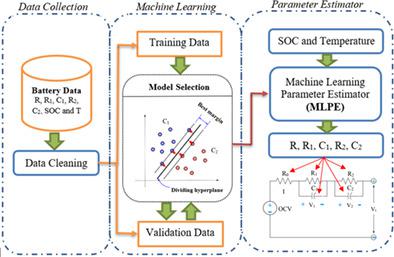当前位置:
X-MOL 学术
›
Int. J. Energy Res.
›
论文详情
Our official English website, www.x-mol.net, welcomes your feedback! (Note: you will need to create a separate account there.)
Machine learning‐based model for lithium‐ion batteries in BMS of electric/hybrid electric aircraft
International Journal of Energy Research ( IF 4.6 ) Pub Date : 2020-11-16 , DOI: 10.1002/er.6197 Seyed Reza Hashemi 1 , Afsoon Bahadoran Baghbadorani 1 , Roja Esmaeeli 1 , Ajay Mahajan 1 , Siamak Farhad 1
International Journal of Energy Research ( IF 4.6 ) Pub Date : 2020-11-16 , DOI: 10.1002/er.6197 Seyed Reza Hashemi 1 , Afsoon Bahadoran Baghbadorani 1 , Roja Esmaeeli 1 , Ajay Mahajan 1 , Siamak Farhad 1
Affiliation

|
Reliable operation and control of battery packs can lead to increasing applications of batteries as energy sources for mobile power systems such as electric/hybrid electric aircraft. If the operation of a battery pack is controlled and monitored thoroughly, the safety in the battery system of an electrified aircraft can be guaranteed. The battery model has many applications in battery management systems such as battery performance analysis and fault detection. To achieve an accurate fault diagnosis for electric aircraft, an intelligent fault detection scheme within an accurate battery cell model is required. In this study, an adaptive lithium‐ion battery model is proposed in which models' parameters are estimated by a supervised machine learning paradigm. This adaptive battery model is developed based on a second order equivalent circuit model, which has a good representation of lithium‐ion batteries dynamics. Comparative verification experiments show good accuracy and robustness of the machine learning‐based parameter estimator lead to an accurate battery model with an average error less than 0.4%. Moreover, to see the effectiveness of this machine learning‐based model in fault detection applications, a model‐based fault diagnosis scheme is developed. Finally, the analysis of fault diagnosis tests under different test conditions proves that the proposed adaptive battery model can significantly improve the fault diagnosis accuracy of batteries.
中文翻译:

电动/混合动力飞机BMS中基于机器学习的锂离子电池模型
电池组的可靠运行和控制可以导致电池作为移动电源系统(例如电动/混合动力飞机)的能源越来越多地应用。如果对电池组的操作进行彻底的控制和监视,则可以保证电动飞机电池系统的安全。电池模型在电池管理系统中有许多应用,例如电池性能分析和故障检测。为了实现电动飞机的准确故障诊断,需要在准确的电池单元模型内的智能故障检测方案。在这项研究中,提出了一种自适应锂离子电池模型,该模型中的参数通过有监督的机器学习范例进行估算。此自适应电池模型是基于二阶等效电路模型开发的,它很好地代表了锂离子电池的动力学特性。对比验证实验表明,基于机器学习的参数估计器具有良好的准确性和鲁棒性,可得出准确的电池模型,平均误差小于0.4%。此外,为了了解这种基于机器学习的模型在故障检测应用中的有效性,开发了一种基于模型的故障诊断方案。最后,通过对不同测试条件下故障诊断测试的分析,表明所提出的自适应电池模型可以显着提高电池的故障诊断精度。对比验证实验表明,基于机器学习的参数估计器具有良好的准确性和鲁棒性,可得出准确的电池模型,平均误差小于0.4%。此外,为了了解这种基于机器学习的模型在故障检测应用中的有效性,开发了一种基于模型的故障诊断方案。最后,通过对不同测试条件下故障诊断测试的分析,表明所提出的自适应电池模型可以显着提高电池的故障诊断精度。对比验证实验表明,基于机器学习的参数估计器具有良好的准确性和鲁棒性,可得出准确的电池模型,平均误差小于0.4%。此外,为了了解这种基于机器学习的模型在故障检测应用中的有效性,开发了一种基于模型的故障诊断方案。最后,通过对不同测试条件下故障诊断测试的分析,表明所提出的自适应电池模型可以显着提高电池的故障诊断精度。
更新日期:2020-11-16
中文翻译:

电动/混合动力飞机BMS中基于机器学习的锂离子电池模型
电池组的可靠运行和控制可以导致电池作为移动电源系统(例如电动/混合动力飞机)的能源越来越多地应用。如果对电池组的操作进行彻底的控制和监视,则可以保证电动飞机电池系统的安全。电池模型在电池管理系统中有许多应用,例如电池性能分析和故障检测。为了实现电动飞机的准确故障诊断,需要在准确的电池单元模型内的智能故障检测方案。在这项研究中,提出了一种自适应锂离子电池模型,该模型中的参数通过有监督的机器学习范例进行估算。此自适应电池模型是基于二阶等效电路模型开发的,它很好地代表了锂离子电池的动力学特性。对比验证实验表明,基于机器学习的参数估计器具有良好的准确性和鲁棒性,可得出准确的电池模型,平均误差小于0.4%。此外,为了了解这种基于机器学习的模型在故障检测应用中的有效性,开发了一种基于模型的故障诊断方案。最后,通过对不同测试条件下故障诊断测试的分析,表明所提出的自适应电池模型可以显着提高电池的故障诊断精度。对比验证实验表明,基于机器学习的参数估计器具有良好的准确性和鲁棒性,可得出准确的电池模型,平均误差小于0.4%。此外,为了了解这种基于机器学习的模型在故障检测应用中的有效性,开发了一种基于模型的故障诊断方案。最后,通过对不同测试条件下故障诊断测试的分析,表明所提出的自适应电池模型可以显着提高电池的故障诊断精度。对比验证实验表明,基于机器学习的参数估计器具有良好的准确性和鲁棒性,可得出准确的电池模型,平均误差小于0.4%。此外,为了了解这种基于机器学习的模型在故障检测应用中的有效性,开发了一种基于模型的故障诊断方案。最后,通过对不同测试条件下故障诊断测试的分析,表明所提出的自适应电池模型可以显着提高电池的故障诊断精度。



























 京公网安备 11010802027423号
京公网安备 11010802027423号